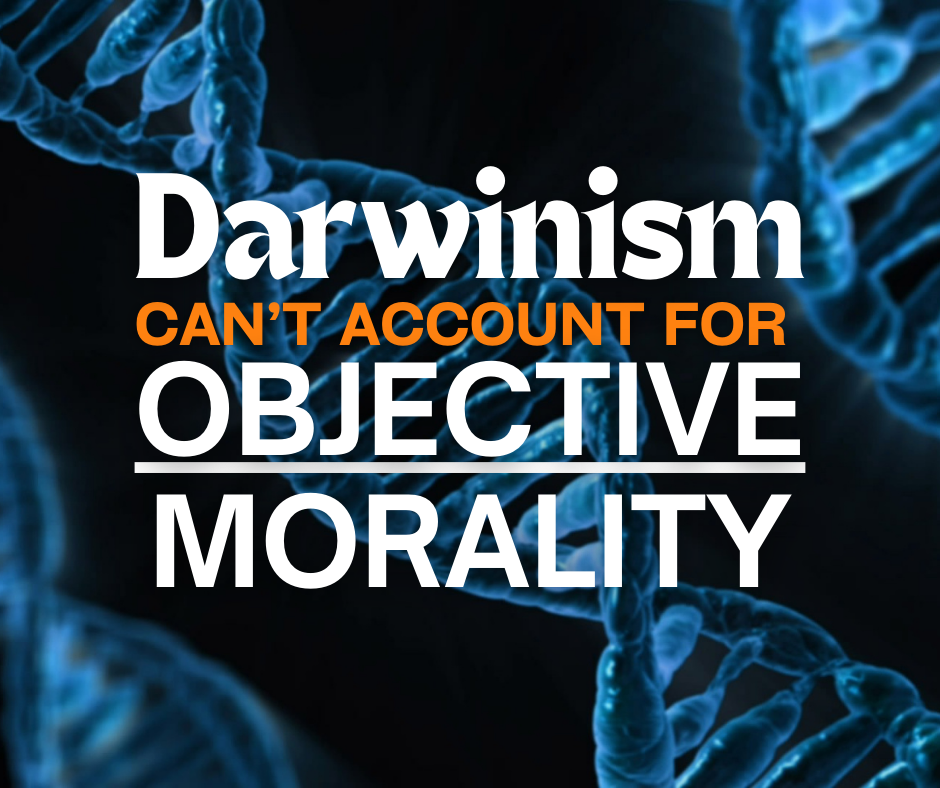 |
| Image from https://www.moralapologetics.com/wordpress/2022/11/1/darwinism-cant-account-for-objective-morality |
Well, of course "Darwinism" can't account for objective morality, because there is no such thing as "Darwinism", and no such thing as "objective morality".
Darwin and Wallace both established the scientific basis of evolution by proposing a mechanism for it, namely the selection of heritable variations. Many other people have contributed to evolutionary science, notably the friar, Gregor Mendel, with his pioneering work on genetic inheritance, and, of course, the work of Franklin, Crick and Watson. Very many others have contributed to evolutionary biology since the publication of "Origin" in 1859. No "evolutionist" (non evophobe) talks of "Darwinism". It sounds as silly as "Newtonism" or "Einsteinism".
Regarding the notion of "objective morality", Oxford Languages give this as a definition of objective,
"not influenced by personal feelings or opinions in considering and representing facts",
and morality as,
"principles concerning the distinction between right and wrong or good and bad behaviour".
It's very hard, given these meanings, to consider that "objective morality" is a coherent notion.
Let's take the commandment "Thou shalt not kill". Many people say that it really means, "Thou shalt not murder", or thou shalt not take the life of an innocent person. Immediately, we get into differing opinions.
What, exactly, is an innocent person, and one who is not innocent?
In what circumstances is it moral to kill someone who is not innocent? Guilty of what?
What, exactly, is a person? A viable foetus brought to term? Or a blastocyst? Or something in between? What about a non-viable foetus?
In what circumstances it it moral to kill a person? In self defence? In defence of others? In war?
Is collateral damage morally acceptable in times of war?
Is it moral to shorten the life of someone who is suffering a terrible terminal disease by giving them powerful pain relief?
Is it moral to execute people for murder?
There is no universal agreement on the questions above. I therefore submit that the notion of "objective morality" has no coherent meaning, otherwise everyone would be forced to agree. There would be facts that can be appealed to which only the mad would deny.
In my opinion, those who claim that objective morality exists, are merely doing so to assert their own subjective moral values by an appeal to authority, in spite of the fact that those who assert what objective morality means in practice cannot agree.
I often wonder if the appeal of the appeal to authority is attracted to by people who do not want to, or cannot take moral responsibility on themselves. Indeed, being brought up in a belief that morality comes from some unreal "authority" does nothing to help develop a personal, internalized sense of morality and responsibility.
So why do we get het up about this business? Why (despite our differences) do we all have a sense of what is right and what is wrong?
Although science cannot prescribe morals, it can help us to understand why we have moral sentiments. We are an interdependent social species. We need one another in order to survive. Sometimes, when we calculate that there is a probable net advantage in cheating, we will take a chance, but we do not do so in general. We have a sense of self-worth and we project our moral rectitude and trustworthiness to others, because we need them.
The world-renowned primatologist Franz de Waal has studied the roots of moral behaviour, particularly among chimpanzees. Here is a write-up of his book, "The Bonobo and the Atheist" from Amazon.
"In this lively and illuminating discussion of his landmark research, esteemed primatologist Frans de Waal argues that human morality is not imposed from above but instead comes from within. Moral behavior does not begin and end with religion but is in fact a product of evolution.
For many years, de Waal has observed chimpanzees soothe distressed neighbors and bonobos share their food. Now he delivers fascinating fresh evidence for the seeds of ethical behavior in primate societies that further cements the case for the biological origins of human fairness. Interweaving vivid tales from the animal kingdom with thoughtful philosophical analysis, de Waal seeks a bottom-up explanation of morality that emphasizes our connection with animals. In doing so, de Waal explores for the first time the implications of his work for our understanding of modern religion. Whatever the role of religious moral imperatives, he sees it as a “Johnny-come-lately” role that emerged only as an addition to our natural instincts for cooperation and empathy.
But unlike the dogmatic neo-atheist of his book’s title, de Waal does not scorn religion per se. Instead, he draws on the long tradition of humanism exemplified by the painter Hieronymus Bosch and asks reflective readers to consider these issues from a positive perspective: What role, if any, does religion play for a well-functioning society today? And where can believers and nonbelievers alike find the inspiration to lead a good life?
Rich with cultural references and anecdotes of primate behavior, The Bonobo and the Atheist engagingly builds a unique argument grounded in evolutionary biology and moral philosophy. Ever a pioneering thinker, de Waal delivers a heartening and inclusive new perspective on human nature and our struggle to find purpose in our lives."
Comment by Logos Formont. . Fb group: Is God for real . . Evolutionary psychology: Morality is a two sided coin. Evolutionary determinism by inherited behavior establishes the primary instructions to "seek gratification that may lead directly or indirectly to mating (sexual gratification) ( objective morality ) . . . Therein exists genetic demands to eat, have sex conditions of altruism, etc. Frome those inherited instructions man may enjoy free will to persue and moralize subjectively.
ReplyDelete